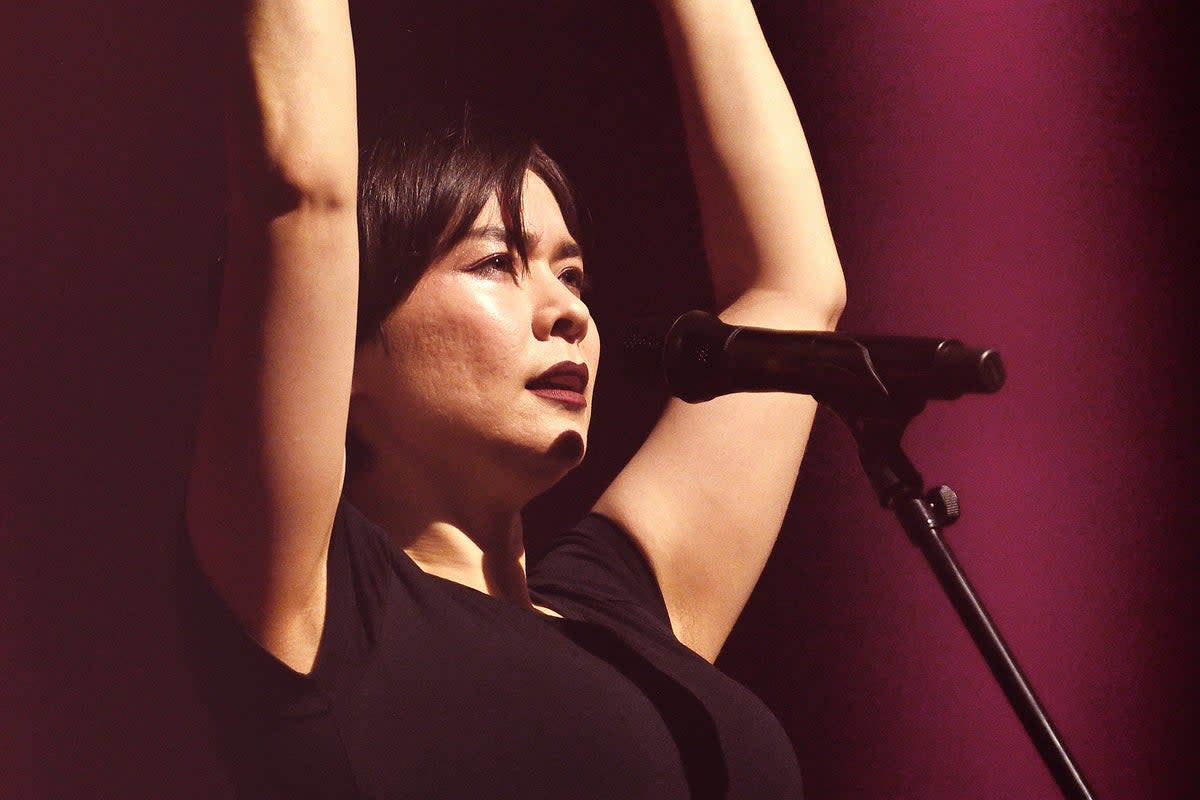Mitski review, Eventim Apollo: America’s best singer-songwriter is a cross between Beyoncé and Marcel Marceau

Mitski, the great American singer-songwriter with a fanbase of screaming teens, steps onto the stage at London’s Eventim Apollo like an impostor. She gazes up at an enormous red curtain hanging at its centre. Stepping behind it, she is rendered in shadow, her interaction with a flood light making her body double, then triple, in size. She launches into the resigned melancholy of “Everyone” – a track about the corrosive nature of attention. The curtain drops soon after to a sea of shrieks, but it’s arguable it needn’t. For the rest of her two-hour show, Mitski is veiled – never literally, but always seemingly on guard and withholding. She is the most open-hearted yet detached performer I’ve ever seen.
Born in Japan and raised all over the world before studying music in New York, Mitski has a very 2020s kind of pop stardom. Only one single – the bruised torch song “My Love Mine All Mine” – has ever bothered the charts in the UK, but she is undeniably a phenomenon, a modern avatar for feelings of yearning and loneliness, who understandably caught fire during the pandemic. She was five albums into her career by then, but all of a sudden the totem of rabid, hungry devotees. It resulted in a delicate dance between Mitski the artist and Mitski the idol. She has expressed unease with the parasocial mania of fandom and made vague gestures at early retirement.
As if to protect herself, her show – in support of her 2023 album The Land Is Inhospitable and So Are We – is more of a performance piece than a rock concert. Dressed in knee pads and a black dress, she moves arrestingly, rotating her wrists, splaying her fingers, panting on all fours and kicking the air. She is both mime and diva – some Marcel Marceau here, some Liza Minnelli there. When she crawls sensually across a pair of chairs in purple light, there’s even a touch of “Formation”-era Beyoncé.
“Working for the Knife”, her pained response to late-stage capitalism, is an early highlight, met with cheers. For “Heaven”, Mitski dances with a single beam of light. A simple guitar strums along to the wounded “Bug Like an Angel”. Audience interaction is at a minimum, as much as the crowd pleads for recognition. Occasional silence – the parts where the band switches between songs or Mitski drinks from a water bottle – must be filled. Young voices shout “I love you”. Mitski barely flinches, and certainly doesn’t reply. Everyone is a baby, and she seems a thousand years old. In one of two brief stretches of chat, she describes herself as the crowd’s “eccentric auntie”. In an earlier monologue, she talks of recognising her own sex appeal only once she hit her thirties (“I realised I’m a hottie,” she laughs). This, wise Mitski tells her foundlings, is usually a time in women’s lives when the world begins to see them as “rotten fruit”. An unwieldy metaphor begins, one involving age, retirement homes and late-in-life sex, which resolves in Mitski claiming that “death is the ultimate orgasm”. “I think I’m losing you,” she says, half-jokingly, sensing the bafflement in an audience that absolutely didn’t experience 9/11.
“I really do love you,” she finally says ahead of the show’s last stretch of poppier tracks – TikTok faves “Nobody” and “Washing Machine Heart” – “even though I know you don’t believe me.” It’s enough to make elements of the crowd feel seen, in its own curious, deadpan way. What a fascinating, funny and quietly radical tension we have here. A crowd begging for bread, and an artist only ever giving crumbs.
Mitski is touring. Her first festival headline show is at All Points East on 18 August

